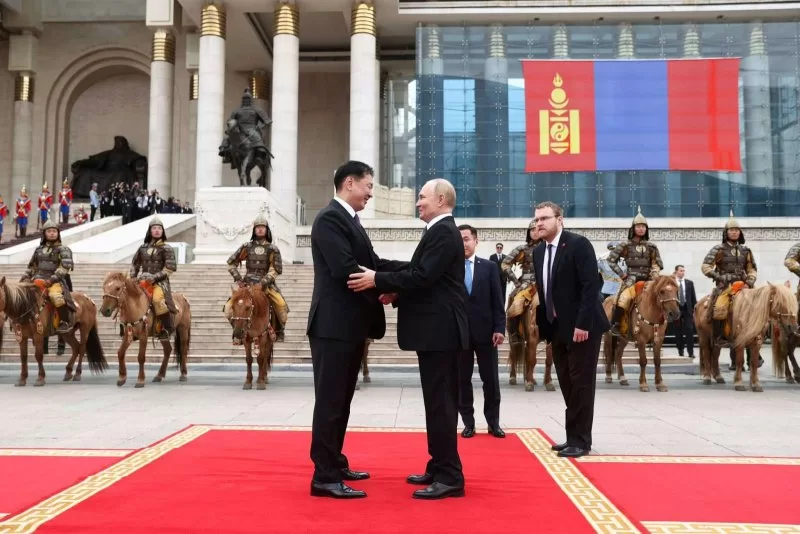Sept. 3 (UPI) — In defiance of an international arrest warrant, Mongolian President Ukhnaagiin Khürelsükh gave a warm welcome Tuesday to his Russian counterpart, Vladimir Putin, who is in the Asian nation’s capital for negotiations at expanding their nations’ partnership.
Putin arrived late Monday in the country, which is a member of the International Criminal Court that has said Ulaanbaatar is obligated to arrest the Russian president under a warrant the court issued last year in connection to the Kremlin’s war in Ukraine.
The trip marks Putin’s first to an ICC member state since the warrant was issued for his arrest in March 2023 for illegally deporting Ukrainian children to Russia.
In flouting the warrant, Khürelsükh welcomed Putin at Sukhbaatar Square in the Mongolian capital with a ceremony during which both of their national anthems were played.
A statement from the office of the Mongolia leader states they both bowed to the flag of the State Honor Guard and Putin greeted soldiers in the square as well as paid tribute before a statue of Genghis Khan, the founder of the Mongol Empire, and signed a guest book at the State Palace.
During a joint press conference held prior to the closed-door negotiations, Putin thanked Khürelsükh for the invitation, stating it has become a “good tradition” that they seem to meet in Mongolia every five years “to celebrate the outstanding and bright events of our common history,” according to a transcript provided by the Kremlin.
“Indeed, our relations are developing in all directions,” Putin told Khürelsükh. “Today, during our discussions, we will undoubtedly return several times to the main areas of our economic cooperation.”
He then extended Khürelsükh an invitation to Russia, specifically to Kazan, where the BRICS intergovernmental organization is to be held later this year. Its founding members are Brazil, Russia, India, China and South Africa, with Egypt, Ethiopia, Iran and the United Arab Emirates later joining.
Ukraine has admonished Mongolia over the state visit, with its foreign ministry accusing Ulaanbaatar of sharing in the responsibilities of Putin’s war crimes by allowing him to escape justice.
“We will work with partners to ensure that this has consequences for Ulaanbaatar,” ministry spokesman Heorhii Tykhyi said in a statement on X.
“The Mongolian government’s failure to carry out the binding ICC arrest warrant for Putin is a heavy blow to the International Criminal Court and the international criminal justice system.”
The World Court last week said it expects Mongolia, like its other signatories, to “execute its decisions.”
Human rights organizations had called on Mongolia to either deny Putin entrance or arrest him on arrival.
“Any trip to an ICC member state that does not end in arrest will encourage President Putin’s current course of action and must be seen as part of a strategic effort to undermine the ICC’s work to prosecute suspected war criminals,” Altantuya Batdorj, executive director of Amnesty International Mongolia, said in a statement.
Maria Elena Vignoli, senior international justice counsel at Human Rights Watch, echoed this sentiment, stating not arresting Putin would be an affront to the many victims of Russia’s crimes while undermining the principles of that no one is above the law.
“The Mongolian authorities have a chance now to demonstrate in concrete terms their commitment to justice for international crimes by denying Putin entry or arresting him if he enters the country,” Vignoli said in a statement.
Putin has made rare international trips since the warrant was issued for his arrest and that of Maria Lvova-Belova, Russia’s presidential commissioner of Children’s Rights.
He visited China in May, followed by a trip to North Korea and then Vietnam in June. Then in July, he attended an Eurasian intergovernmental security summit in Kazakhstan. None of those countries are among the 124 members of the ICC.
Last year, Putin pulled out of attending a BRICS summit that was to be held in South Africa, an ICC signatory, due to the arrest warrant.
Russia invaded Ukraine Feb. 24, 2022. Since then, tens of thousands of Ukraine children are believed to have been forcibly deported to Russia.
